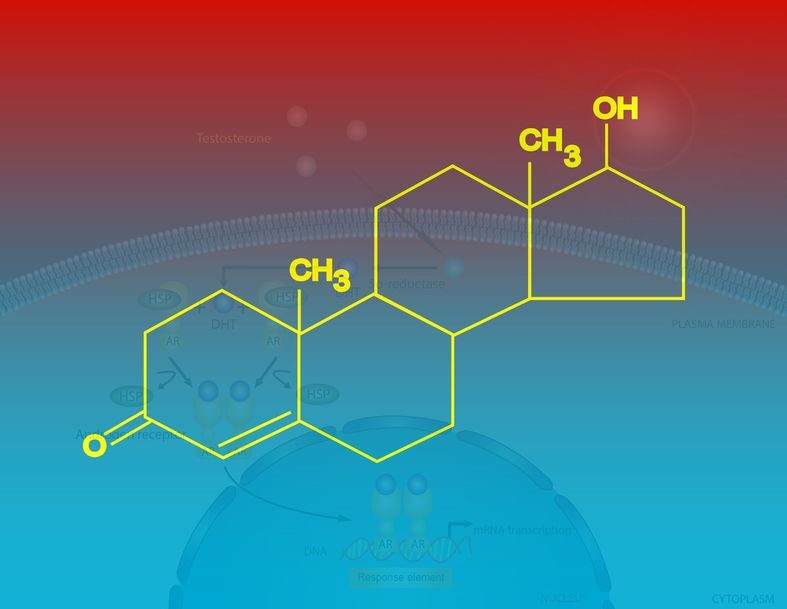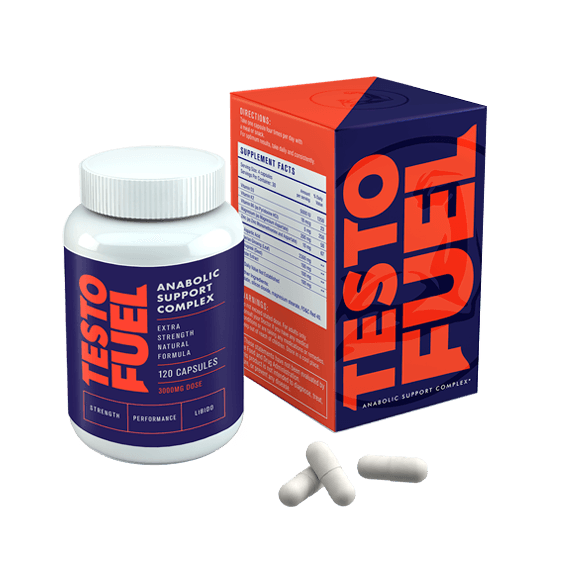
When you think about testosterone what do you see? Big, bulging physiques and an aggressive personality? Maybe men with high sex drives or competitive natures?
If so, you’re not alone. But the real science shows testosterone is way more than its misleading stereotypes. It’s arguably the most important hormone for your health.
In this article, we’ll uncover exactly what makes the masculine hormone so intrinsic to your wellbeing and fitness.
From how it can impact your bone density and mental health, right through to the size of your muscles and libido. Want to know more about your potent androgen? Keep reading.
What is testosterone?
Testosterone is a primary sex organ and an anabolic steroid. It’s present in all mammals and at it’s most potent in males.
While women create small amounts in their ovaries, men can produce up to ten times that amount, primarily in their testes with a trace quantity generated in the pituitary gland.
Testosterone really comes into its own when adolescent men are in their teens. It ramps up during puberty, hits a peak in production around 19, and carries on thriving into the 20s and sometimes even longer.

If you’re a grown man whose been through that, you’ll know the feeling firsthand. We’ll go into exactly how testosterone goes to work in your body in the next section.
Once men reach around age 30, their testosterone production starts natural decline. Unfortunately, the process is inevitable, and everybody eventually goes through it.
While some people find their testosterone fires on all cylinders into later life, most start to feel the effects in their late 30s and 40s.
Getting older isn’t a dead end for your testosterone, though. If it were, we’d wrap this up right not and tell you to suck it up and find a way to stop time.
But, like all things connected to your health, there’s more at play than father time.
Lifestyle can play a pivotal part in how well – or how poorly – your hormones are balanced. All your habits, diet and exercise included, can affect it.
Men who lead a healthy active life are already one step ahead of the curve when it comes to protecting their testosterone.
Spending your evenings sat on the couch with chips and ice cream being hunched up in a poorly lit cubicle all day doesn’t bode well for your primary androgens – but you’d have guessed that already.
Testosterone function
Earlier we asked you to conjure up an image of what testosterone looks like. For most people, it’s a strong man with impressive musculature, baldness, and a mean look.
But there’s so much more to the complexities of testosterone than the Hollywood stereotypes portray.
Experts say that normal men administered with high doses of T don’t see increased cases of self-reported aggression, which squashes the always-angry guy rumor [1].
Apparently, the issue is mostly seen in men with pre-existing violent, aggressive or antisocial personalities.
A lot of what people think they know about testosterone is misguided thanks to the side effects of abusing synthetic anabolic steroids.
Before we go any further, it’s important to understand this article is inspecting and deconstructing the effects of natural testosterone produced by your body.
We will not be looking into the use of lab-created testosterone for any kind of performance enhancement.
Testosterone replacement therapy should only ever be prescribed by a registered medical professional and buying it on the black market is breaking the law.

Here are the functions of testosterone in the male body [2]:
- Muscle size and strength
- Bone growth and density
- Fat distribution
- Libido
- Sexual function and sperm count
- Mood
- Production of red blood cells
- Development of body, pubic, and facial hair during puberty
- Voice deepening during puberty
- Growth of penis and testes
- Could contribute to balding in later life
- Assertiveness
As you can see, testosterone doesn’t just influence what you see in the mirror. It can even alter your energy, mood and mental wellbeing just as much as your bicep circumference.
There aren’t many aspects of your health left untouched, which is why it’s so important.
Well-balanced testosterone allows your body to operate at peak performance. It instigates muscle protein synthesis to drive strength and size gains, while promoting the burning of fat for a leaner body composition[3][4].
Testosterone also keeps bones strong, making them resilient and ready for whatever the outside world has in store. Stronger bones are one of the most underrated rewards of thriving hormones – especially when you’re older.
Testosterone also has similar functions in women. These can include ovarian function, sex drive, physical performance, muscle growth, and bone strength[5][6].
Testosterone levels
Take a second to picture all the men you know – go across every age group – and consider how different they are. It should come as no surprise that healthy testosterone levels span such a similar scope too.
Normal levels of testosterone in men typically fall between 300 and 1000 ng.dL.
According to the American Urological Association, anything under the 300 ng.dL cut off can be considered low[7].
Although this is mainly seen in older adults, it can happen at any age.
Teenage boys with lower levels of testosterone sometimes don’t experience all the expected masculine changes during puberty.
Their voice may not deepen properly, while their facial and body hair doesn’t always come through. Muscle and bone growth might also be affected, leaving them shorter, weaker, and more prone to injury than their peers.
But making it to your twenties doesn’t mean you’re high and dry either.
Low testosterone in adults is a growing concern across the globe, with experts saying this current generation’s T actually falls behind their forefathers. To put it plainly, underperforming testosterone is on the rise[8].
According to research, our modern indoor and high-stress lifestyles don’t do us any favors. Pile on poor diet choices and sedentary lifestyles leading to obesity, and we’re looking at a testosterone production crisis[9]. The silver lining is you can control many of the contributing factors.
There are no positives to low testosterone. Symptoms range from mildly uncomfortable to life changing; causing distress not just physically, but emotionally too.
It’s important to spot the warning signs early so you can make necessary changes to your lifestyle or seek medical help. Some men find it’s their way of living and not just age or illness pulling down their testosterone scores.

Here’s a list of low testosterone symptoms to look out for[10][11]:
- Muscle & strength loss
- Fat gain
- Poor sleep
- Low sex drive
- Infertility
- Decreased sexual performance
- Low mood
- Anxiety and depression
- Irritability
- Bone loss
- Gynecomastia (development of large breasts in men)
Age-related low testosterone isn’t usually considered a cause for medical intervention. Your doctor might suggest lifestyle changes first, such as losing weight, reducing stress, and exercising more. However, testosterone replacement therapy is sometimes an option.
Facts & information about testosterone
So far, we’ve learned what testosterone does for you. But now you’re probably wondering what you can do in return.
Fortunately for the hormone conscious male, there’s a lot of evidence out there on how to optimize testosterone and turn the body into an androgen haven. Interested? These are the facts to brush up on.
Eat the right foods

Saying you are what you eat seems like the most outdated line in fitness. Yet, when it comes to testosterone, it still reigns true.
Your primary androgen hormone is synthesized from cholesterol, meaning healthy fats should be a key part of your diet. Eggs, fatty fish, organ meats, avocado, and walnuts are all a great place to start – add them to your diet plan today.
Vitamin and mineral deficiencies are always a risk to your health. Evidence suggests that not getting enough vitamin D[12], zinc[13], and magnesium[14] can cause testosterone levels to drop.
However, in the case of deficiencies, taking a supplement could help rejuvenate production.
In 2012, experts estimated that vitamin D deficiency impacts around 50% of the Earth’s population[15].
If you’re reading this on your commute to work in the northern hemisphere, you’re part of one of the more at-risk groups.
However, one study shows that when vitamin D deficient men with low testosterone were given a vitamin D supplement, they increased their testosterone levels by 20%[16].
So, if you’re not getting 15-30 minutes of direct sunlight a day, consider upping your vitamin D intake from food and supplements.
Known for your hard work ethic in the gym? Zinc could help keep testosterone levels elevated when they’d usually diminish during periods of intense exercise.
Scientists found this out after analyzing how wrestlers’ hormones reacted to Zn supplementation during a hardcore four-week training camp[17].
Zinc-rich foods include meat, shellfish, nuts, dairy, eggs, and zinc supplements.
It’s important to note that taking more of something might only impact your testosterone if you’re deficient in it. Try a good multivitamin or high-quality testosterone supporter to cover all bases.
Exercise more – especially with weights

Leading a sedentary lifestyle isn’t the way to go if you want thriving testosterone. Men who spend their day sat around without exercise don’t have the same hormonal needs as active types.
Unbeknown to them, their body is smart and conservative, so typically produces less T to meet the demand. Not only that, but a lack of exercise coupled with poor food choices may lead to obesity, which studies say can also cause low testosterone[18].
Obesity and low testosterone is another vicious cycle you’re always best to steer clear from.
Chances are if you’re a regular reader of Greatest Physiques, you’re already well equipped with a gym membership and a history of crafting your own masterpiece.
Now the question stands – do you lace up your running shoes or put in a reservation at the squat rack this evening?
The good news is both moderate cardio and weightlifting could give your T a boost. But it’s lifting weights that appears to be the best for short-term and long-term increases.
Studies show that your testosterone takes a short-term spike after a session under the barbell and when you continue to train week after week, long-term results can be made too[19][20].
Look to stay consistent with your workouts for maximum effect and keep a training log to ensure you’re employing progressive overload. Keeping track of your progression can also provide a tool for reflection and affirmation if you ever need it, not to mention motivation.
Supplements that support testosterone
Are you already a regular in the free weight section? If so, there’s a high chance you take supplements, even if it’s just a protein powder and multi-vit.
But now might finally be the time to branch out to others shown to support testosterone too.
Ashwagandha – an adaptogen herb with roots in ancient medicine – is one of them. Experts say it helps your body adjust to stress and is a potent remedy for reducing anxiety[21].
It’s also been seen to improve testosterone levels and fertility[22]; as well as ramping up lean muscle mass gain, exercise performance, and fat loss when combined with resistance training[23].
No one really knows exactly how ashwagandha benefits your hormones, but there’s a high probability it’s by reducing cortisol levels.
D-Aspartic Acid – a natural amino acid – is another notable mention. Scientists believe it works by elevating levels of luteinizing hormone and follicle stimulating hormone[24]; with luteinizing hormone triggering testosterone production on arrival to the testes from your pituitary gland.
Research has shown D-AA may improve testosterone levels with low-testosterone suffering men enjoying the most benefit[25][26].
If your T levels are already healthy, you probably won’t experience much effect on your hormones from taking D-AA. However, according to one study, you might hike up your muscular hypertrophy and strength gains[27].
We should probably reintroduce vitamin D, magnesium, and zinc here too. Because while they’re all readily available in whole foods, you wouldn’t struggle to find them in your local supplement store either.
Most testosterone boosters combine all three with the likes of D-AA and more because of the amount of evidence behind them.
You already understand what you put into your body has an incredible impact on how it performs. Choosing a reputable brand with good manufacturing procedures is one of the easiest ways to control the quality of your supplement purchases.
Research brands and read the relevant studies that support or disregard their ingredients. After all, this is your testosterone we’re talking about.
Reduce stress for healthier hormones

Stress is the modern man’s badge of honor. Yet, if he knew what the grind could do to his hormones, he’d probably think twice before piling on the extra pressure.
An acute response to stress is the release of cortisol, which can be beneficial in small doses.
But when stress becomes chronic, so do sky-high cortisol levels. Unfortunately, cortisol and testosterone can’t coexist harmoniously, and when your blood levels of the stress hormone are high, testosterone suffers[28].
Cue a vicious cycle of fatigue, low mood, and anxiety to exasperate your stressed-out symptoms even further.
On the other hand, keeping stress to a reasonable level can create a perfect environment for testosterone production.
Cortisol levels are low, meaning your androgen hormones aren’t in competition with them. You could also find like your low testosterone symptoms like low libido, tiredness, and anxiety improve too.
Interestingly, one study showed that transcendental meditation might be one of the best tools for boosting testosterone while cutting cortisol[29].
But a lot of men prefer to relax by taking up a hobby, exercising, or spending more time doing something they enjoy.
The bottom line
Testosterone is the primary male sex hormone and is a powerful anabolic steroid. It’s responsible for catapulting pre-teens into puberty and turning adolescents into fully grown males.
Your muscle mass, energy, libido, mood and more all have T working behind the scenes to maintain their health.
It’s without a doubt that testosterone can be complex. But by using the information above, you could start making a difference to your production today.
Age-related testosterone decline might be an inevitability we’d rather forget about. But that doesn’t mean your hormone health is completely out of your hands.
Bottom line – lead from the front with a well-balanced and active lifestyle that supports it.
References
[1] https://www.ncbi.nlm.nih.gov/pmc/articles/PMC3693622/
[2] https://www.nih.gov/news-events/nih-research-matters/understanding-how-testosterone-affects-men
[3] https://www.ncbi.nlm.nih.gov/pubmed/2917954
[4] http://www.jlr.org/content/early/2018/08/10/jlr.R086975.full.pdf
[5]https://www.health.harvard.edu/drugs-and-medications/testosterone–what-it-does-and-doesnt-do
[6] https://bjsm.bmj.com/content/early/2019/09/26/bjsports-2018-100525
[7] https://www.urologyhealth.org/urologic-conditions/low-testosterone
[8] https://www.ncbi.nlm.nih.gov/pubmed/17062768
[9] https://www.ncbi.nlm.nih.gov/pubmed/17209224
[10] https://www.ncbi.nlm.nih.gov/pmc/articles/PMC2544367/
[11] https://www.ncbi.nlm.nih.gov/pmc/articles/PMC4391003/
[12] https://www.ncbi.nlm.nih.gov/pubmed/20050857
[13] https://www.ncbi.nlm.nih.gov/pubmed/8875519
[14] https://www.ncbi.nlm.nih.gov/pmc/articles/PMC3958794/
[15] https://www.ncbi.nlm.nih.gov/pmc/articles/PMC3356951/
[16] https://www.ncbi.nlm.nih.gov/pubmed/21154195
[17] https://www.ncbi.nlm.nih.gov/pubmed/16648789
[18] https://www.ncbi.nlm.nih.gov/pmc/articles/PMC3955331/
[19] https://www.ncbi.nlm.nih.gov/pubmed/9660159
[20] https://www.ncbi.nlm.nih.gov/pubmed/17051372
[21] https://www.ncbi.nlm.nih.gov/pubmed/23439798
[22] https://www.ncbi.nlm.nih.gov/pubmed/19789214
[23] https://www.ncbi.nlm.nih.gov/pubmed/26609282
[24] https://www.ncbi.nlm.nih.gov/pubmed/19860889
[25] https://www.ncbi.nlm.nih.gov/pubmed/19860889
[26] http://file.scirp.org/pdf/ASM20120400001_62630923.pdf
[27] https://www.ncbi.nlm.nih.gov/pubmed/24074738
[28] https://www.ncbi.nlm.nih.gov/pmc/articles/PMC3880087/
[29] https://www.ncbi.nlm.nih.gov/pubmed/7825892




Leave a comment